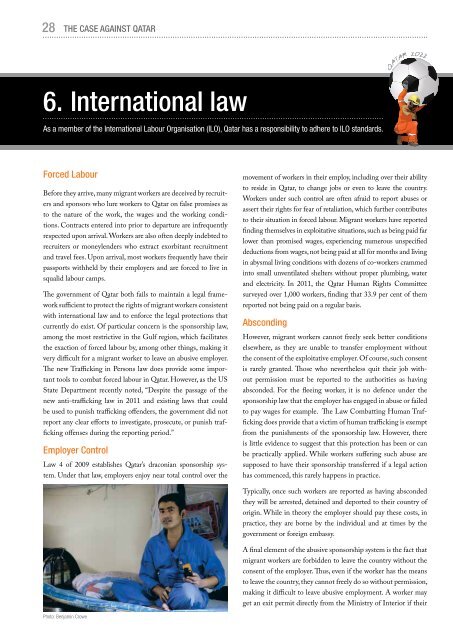11t5l
11t5l
11t5l
You also want an ePaper? Increase the reach of your titles
YUMPU automatically turns print PDFs into web optimized ePapers that Google loves.
28 THE CASE AGAINST QATAR6. International lawAs a member of the International Labour Organisation (ILO), Qatar has a responsibility to adhere to ILO standards.Forced LabourBefore they arrive, many migrant workers are deceived by recruitersand sponsors who lure workers to Qatar on false promises asto the nature of the work, the wages and the working conditions.Contracts entered into prior to departure are infrequentlyrespected upon arrival. Workers are also often deeply indebted torecruiters or moneylenders who extract exorbitant recruitmentand travel fees. Upon arrival, most workers frequently have theirpassports withheld by their employers and are forced to live insqualid labour camps.The government of Qatar both fails to maintain a legal frameworksufficient to protect the rights of migrant workers consistentwith international law and to enforce the legal protections thatcurrently do exist. Of particular concern is the sponsorship law,among the most restrictive in the Gulf region, which facilitatesthe exaction of forced labour by, among other things, making itvery difficult for a migrant worker to leave an abusive employer.The new Trafficking in Persons law does provide some importanttools to combat forced labour in Qatar. However, as the USState Department recently noted, “Despite the passage of thenew anti-trafficking law in 2011 and existing laws that couldbe used to punish trafficking offenders, the government did notreport any clear efforts to investigate, prosecute, or punish traffickingoffenses during the reporting period.”Employer ControlLaw 4 of 2009 establishes Qatar’s draconian sponsorship system.Under that law, employers enjoy near total control over themovement of workers in their employ, including over their abilityto reside in Qatar, to change jobs or even to leave the country.Workers under such control are often afraid to report abuses orassert their rights for fear of retaliation, which further contributesto their situation in forced labour. Migrant workers have reportedfinding themselves in exploitative situations, such as being paid farlower than promised wages, experiencing numerous unspecifieddeductions from wages, not being paid at all for months and livingin abysmal living conditions with dozens of co-workers crammedinto small unventilated shelters without proper plumbing, waterand electricity. In 2011, the Qatar Human Rights Committeesurveyed over 1,000 workers, finding that 33.9 per cent of themreported not being paid on a regular basis.AbscondingHowever, migrant workers cannot freely seek better conditionselsewhere, as they are unable to transfer employment withoutthe consent of the exploitative employer. Of course, such consentis rarely granted. Those who nevertheless quit their job withoutpermission must be reported to the authorities as havingabsconded. For the fleeing worker, it is no defence under thesponsorship law that the employer has engaged in abuse or failedto pay wages for example. The Law Combatting Human Traffickingdoes provide that a victim of human trafficking is exemptfrom the punishments of the sponsorship law. However, thereis little evidence to suggest that this protection has been or canbe practically applied. While workers suffering such abuse aresupposed to have their sponsorship transferred if a legal actionhas commenced, this rarely happens in practice.Typically, once such workers are reported as having abscondedthey will be arrested, detained and deported to their country oforigin. While in theory the employer should pay these costs, inpractice, they are borne by the individual and at times by thegovernment or foreign embassy.A final element of the abusive sponsorship system is the fact thatmigrant workers are forbidden to leave the country without theconsent of the employer. Thus, even if the worker has the meansto leave the country, they cannot freely do so without permission,making it difficult to leave abusive employment. A worker mayget an exit permit directly from the Ministry of Interior if theirPhoto: Benjamin Crowe


